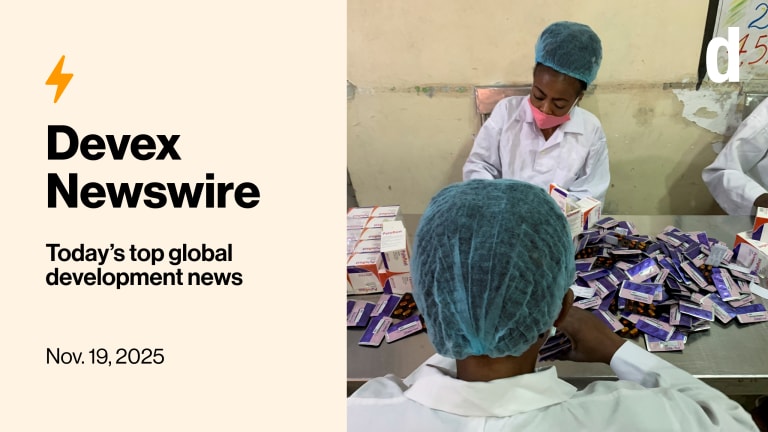Will a new competitive election process for the African Union Commission yield results?
Reforms at the AU have resulted in a new merit-based process to elect commissioners, in a bid to strengthen its leadership, but analysts warn it cannot solve all the union's problems.
GABORONE — As the African Union prepares for its first commission election since rolling out reforms in 2017, analysts are closely watching what is expected to be a stress test of the body's attempt at establishing a competitive and merit-based system. The AU Commission is the secretariat of the AU, responsible for coordinating and liaising with member states, regional bodies, and external partners. After the elections early next year, it will be led by eight officials — a chairperson, deputy chairperson, and six commissioners responsible for particular portfolios, who are elected for a term of four years, renewable once. In 2016, African leaders agreed to an institutional reform of the AU, after a review of the organization found that its complicated structure and limited managerial capacity had led to inefficient working methods, poor decision-making, and a lack of accountability — issues that had long been raised by critics. “It is imperative that the African Union renews its focus and the way it works ... It must create an efficient and effective African organisation that will drive and deliver the continent’s agenda within the shifting global landscape,” the authors wrote. They recommended making the commission’s structure leaner and more efficient and revising the election process to be more competitive. “It's really important that we have commissioners who are not only qualified in these areas but who can also take Africa to the next level of development, especially linking our Agenda 2063 to the U.N. SDG goals.” --— Luckystar Miyandazi, policy officer, ECDPM As a result, the existing eight commission portfolios have been reduced to six, with peace and security to be merged with political affairs, and economic development with trade and industry. A merit-based system has also been introduced to shortlist potential candidates. Most analysts agree the new process has resulted in a more competitive environment. But they also say the process remains political and will not solve all the AU’s challenges. At stake is the representation of a common African perspective on the world stage and the right leadership to tackle continentwide challenges, including sustainable development. A new competitive, merit-based process Previously, the selection process for candidates consisted of preselection at a regional level — each region was allowed to propose two candidates for the commissioners — who would then be vetted by a team of consultants to ensure they met the required criteria. This year, for the first time, the AU laid out clear terms for selecting candidates for each position up for election, according to Philomena Apiko, policy officer at the European Centre for Development Policy Management, as part of a much more rigorous process to strengthen the quality of candidates. Selection was guided by five principles: equitable regional and gender parity; predictable regional rotation; attracting and retaining Africa’s top talent; accountable and effective leadership management; and transparency and merit-based selection. With this in mind, an independent human resources firm along with a panel of eminent persons from each of the five regions on the continent were chosen to assist the AU to come up with a process of preselection and create the job profiles of each of the AUC positions. They opened up the call to member states that, in September, handed in their nominations for the posts. These candidates were then put through an assessment process which included competency-based interviews, assimilation exercises, and psychometric assessments. “Through this process, candidates for the six commissioner portfolios were narrowed down from an initial 89 candidates to 25, who member states will vote for next year,” Apiko said. The newly-reformed process is far more competitive. For example, Victor Harison of Madagascar, the current AU commissioner for economic affairs, and Albert Muchanga of Zambia, the current commissioner for trade and industry, were both nominated for reelection for the expanded trade and industry position. But from the prequalified candidates, only Muchanga achieved the score required for the shortlist, leaving Harison out of the running. Politics still at play While the reforms appear rigorous, politics will likely still play a part in the selection process, according to Luckystar Miyandazi, another policy officer at ECDPM, who described the reform efforts as part-political, part-diplomatic, and part-technical. “The recommendations from the reform process were mostly a bit technical and now we have to deal with the politics of it, which is how elections go, you have to campaign,” she said. Mohamed Diatta, a researcher at the Institute for Security Studies, said the fact that the current chairperson of the AUC, Moussa Faki Mahamat, is standing for his position unopposed is an indication that the election remains a political process. “You can say ‘we are going to make it a merit-based competitive process’ … [but] at the end of the day there will always be politics and at times politics will actually be the No.1 factor,” he said. Though Faki running unopposed does not guarantee him the position as he still needs to secure a two-thirds majority in the vote, according to Apiko, it does raise some questions. “From our understanding, there were some two candidates who were proposed before, one from Zimbabwe, the other from Ghana, but the nomination from Zimbabwe did not receive the backing of the country and the one from Ghana withdrew [after just] 48 hours, but it is not clear why,” she said. “It does raise questions as to why he is going unopposed. Is it that member states fully support him, or is it that no one was seen as a worthy candidate? We are also not really clear [on this].” Much at stake Analysts agree that the new commission will play a pivotal role in shaping and implementing Africa’s continental policy priorities. “You can say ‘we are going to make it a merit-based competitive process’ … [but] at the end of the day there will always be politics and at times politics will actually be the No.1 factor.” --— Mohamed Diatta, researcher, Institute for Security Studies For this reason, Apiko believes it is important to have strong leadership in place to implement the various pan-African policies that the AU has been putting forward and to present Africa’s common position on issues such as climate change and COVID-19. Miyandazi said that to achieve these goals, “extremely strong personalities” are needed. “It's really important that we have commissioners who are not only qualified in these areas but who can also take Africa to the next level of development, especially linking our Agenda 2063 to the U.N. SDG goals,” she said. The new commission will also be responsible for implementing internal reforms and dealing with challenges such as corruption, nepotism, and mismanagement that have plagued the commission in the past, Diatta said, arguing that some staff “are not really qualified for the positions that they occupy.” The reforms are supposed to address this and introduce performance evaluations for staff and a more stringent process “to make sure that the right people are in the right positions,” he explained. “But all of these rules will only be put into place by the new commission.” “First of all, you need new leadership. It has to be new people, I have no doubt about that. Then it has to be bold and courageous leadership, to try and move things in the AU Commission,” he said. However, Diatta warned that even this reformed commission cannot solve all the challenges within the AU. “Member states will typically say, and … it is actually largely true, that the commission is inefficient in many ways… but is the commission responsible for the absence of action from the African Union when it comes to the peace and security and governance challenges that we see on the continent? ... I would say it's an issue with member states more than the AU Commission,” he said. Diatta added that “the continent has been good at pinpointing where the issues are, what the issues are, and seeing where they begin, but the AU has not been good at taking action.” The reforms fail to address this because “the focus has been on the institutional reforms ... Does it address the gap between early warning and early action? No, it doesn't,” he said. He cited the example of the Africa Continental Free Trade Area and the current elation over the assumption of trade next year. Although there has been progress on establishing free trade, AfCFTA was supposed to happen concurrently with free movement of people, a single currency and the establishment of an African Central Bank — elements which member states have failed to act on and which are needed “if we are to make this trade work for the continent,” he said.
GABORONE — As the African Union prepares for its first commission election since rolling out reforms in 2017, analysts are closely watching what is expected to be a stress test of the body's attempt at establishing a competitive and merit-based system.
The AU Commission is the secretariat of the AU, responsible for coordinating and liaising with member states, regional bodies, and external partners. After the elections early next year, it will be led by eight officials — a chairperson, deputy chairperson, and six commissioners responsible for particular portfolios, who are elected for a term of four years, renewable once.
In 2016, African leaders agreed to an institutional reform of the AU, after a review of the organization found that its complicated structure and limited managerial capacity had led to inefficient working methods, poor decision-making, and a lack of accountability — issues that had long been raised by critics.
This story is forDevex Promembers
Unlock this story now with a 15-day free trial of Devex Pro.
With a Devex Pro subscription you'll get access to deeper analysis and exclusive insights from our reporters and analysts.
Start my free trialRequest a group subscription Printing articles to share with others is a breach of our terms and conditions and copyright policy. Please use the sharing options on the left side of the article. Devex Pro members may share up to 10 articles per month using the Pro share tool ( ).
Rumbi Chakamba is a Senior Editor at Devex based in Botswana, who has worked with regional and international publications including News Deeply, The Zambezian, Outriders Network, and Global Sisters Report. She holds a bachelor's degree in international relations from the University of South Africa.








